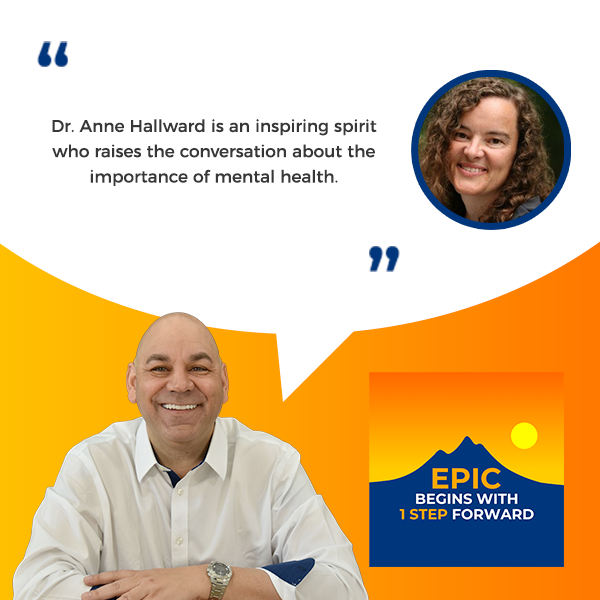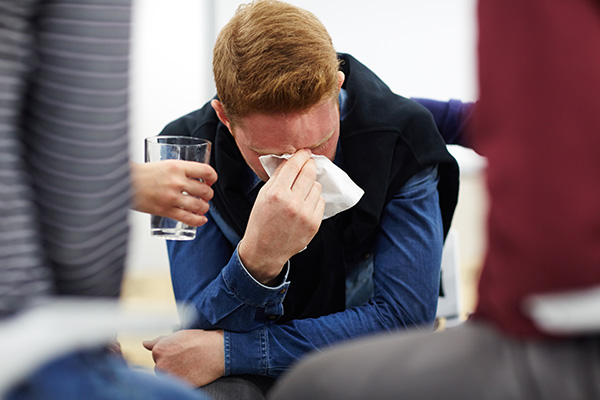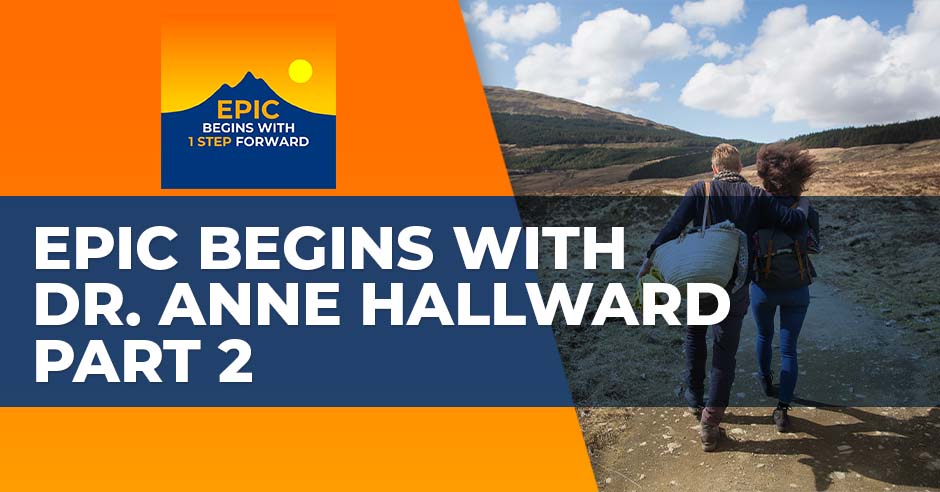—
Listen to the podcast here
EPIC Begins With Dr. Anne Hallward Part 2
I think it is so important for us to keep in mind this thing that I came up with that I call the 97-3 Rule. Ninety-seven percent of your day, Anne, is good and the 3% isn’t as good, but we tend to focus on the 3% and ignore the 97% that went well. Why? There’s so much positive that you can point to so many victories and heroic things that you did that got you here. Yes, stuff does go bad and we all have days where that 3% is enormous. It’s hard to say what that 97% is cause we had bad days.
However, I do believe that for most of us, there’s so much more going right. Being a historian, I always look back at stuff and go, “What historical reason is there for this?” I wonder, here in the United States, especially in New England, there is this underlying puritanical belief system that we have to suffer for our life to have meaning and to get to heaven.
Even though I don’t live in New England anymore, I fight this every day. Honestly, people from New England are never happier than when they’re suffering the most. Being a Red Sox fan until 2004 is an absolute perfect example of almost getting what you want, not getting it, and somehow being okay and saying, “That’s my lot in life.”
You live in Maine. It is beautiful, but it is what I call living for 10 months for 2 months. You’re living for two months in decent weather, and it is cold for the rest of the time. There are Arctic vortexes. There are horseflies. The roads are crammed at fall with all the leaf peepers. It takes you four times as long to get into Portland because there are all these people and the hand goes out and points to the one billionth oak tree that has changed colors.
You are so funny. As a Mainer, I’m like, “No, that’s not fair at all.” It’s the 2 months of late fall and the 2 months of early spring. The rest of them, four months of crystal view. From a Maine perspective, you went to live in a place with earthquakes and wildfires. What are you thinking, Zander?

Anne, let me tell you, as a Mainer, I think that Maine’s state motto should be, “Thanks for coming. Now, leave.”
Negativity B ias
You’re good with accents. I want to come back to your 97-3 rule. I think you’re onto something that neuroscience is also investigating. They call it The Negativity Bias. The idea is that the amygdala, the part of your brain that is very focused on the emotional meaning of events and that is scanning, is very focused on the most painful things that have ever happened to you to try to protect you from them happening again. The amygdala is wired into our brain. I don’t think it has to do with what region of the country we live in, but I think your theological reflections seem true. I think that it is the body’s attempts to protect itself. We focus so much on what hurts us to try to spare us suffering. It’s a good intention there.
I do think that we tend to focus on the 1 or 2 things that didn’t go right. There’s so much other stuff that is going right. It’s the stuff that I think we tend to overlook, and in that 3%, I guarantee some of that, there’s shame in there. We’ll get back to the shame in just a second. My point is that I get up in the morning and take a walk. I know you took a walk before we talked.
You saw beautiful things, and it was great, but if you went to get on this meeting and your camera or internet wasn’t working, you might focus and say, “It was terrible. I was having a problem with the internet and stuff.” Somehow, you completely forget all the beauty that you just saw and say, “My day wasn’t good because my internet didn’t work.” You completely forgot that maybe you had a delicious meal. You saw beautiful things.
I think that’s right. Negativity bias. It’s there.
I do agree that, yes, we are unbelievably complex machines that are adaptive, and of course, we’re trying to avoid getting hurt. Let’s get back to you had more.
We are unbelievably complex machines. We are adaptive and always trying to avoid getting hurt.
Excitement And Hard Work
Zander, you asked me if it was as hard as I thought it would be. I think that has chapters to it because I would say the first chapter was pretty thrilling and exciting. Was it scary to do my first live show on the radio? Yes. Was I scared? Yes, I was but it was just so exciting that I was buoyed by so much energy. After it became a weekly commitment, there was a fair amount of hard work involved. Finding the guest, reading their book, preparing the question, and preparing the guest. It turned out to be there was also an element of slog to it. I wouldn’t want to falsely represent it as all inspiration and excitement because it was both.
With anyone’s epic journey, whatever you’re taking on, there is absolutely a lot of blood, sweat, and tears, a lot of work that goes into making that happen. There are times when we get incredibly lucky and the right person at the right time. Here’s what we’re saying. That’s great. That person has the ability to do something that helps accelerate your message.

One Step Forward: Every epic journey involves a lot of blood, sweat, and tears.
Let’s say someone from a bigger national public radio station hears your show and says, “That’s great. I want to share that with more.” You weren’t trying to pitch them. Someone else heard it and said, “I can help this.” That does happen, but not often. I know that as I’m trying to build my YouTube channel and stuff, it is a snowball. It will get to a point where I have enough people subscribed and listening, and it will pick up. In the meantime, I have to keep doing it the same way I know with the work you’ve done with Safe Space Radio. At some point, there’s enough momentum for stuff to start to happen without you just having to get behind the cart and push quite so hard.
I would say again, it comes in waves. That happens. You ride it for a while, then you’re back behind the car and pushing again.
There’s a certain amount of fun in the slog.
Yes, mostly. I’ve been doing it for years now. I would say that some moments are so fun and so incredibly moving, so inspiring. It touches my heart so deeply and other times, there’s a lot of grant writing, fundraising, admin and board meetings. There are things that are really less fun. There’s a range.
I know my goal is to try and get to a point where I can have the people who are better at those jobs, the admin and the marketing. Just because they do that much easier and our energy is much better used or time is better used to going out and doing those things. I also think part of that epic journey is as you start on it, you think about what equipment do you need for your journey? Oftentimes, we have no idea.
If we go back to your climbing a mountain analogy, you start and you have no idea, and maybe you got hiking boots and some water, but then as you’re going along, you’re, “A walking stick would be really helpful. Maybe a compass that at least lets me know what direction I’m going in.” Chocolate gorp would be good. As we’re on these journeys, we do become a wimp. Sometimes you go in and go, “I know I need some gorp, hiking boots and a backpack.”
You come in because of your life experience or whatever, just thinking about it for a moment and saying, “I probably need these things.” I know you long to be able to just do the radio part, do that part, and not get burdened down with all of the marketing and stuff. Although you can do it and I can do it, it’s not my forte. It’s not where I want to spend my time. I want to spend my time doing stuff like this. This is the fun part.
When you find a good person or if I do, maybe I’ll let you know.
Shame And Sibling Survivors
It depends on how good they are because sometimes you’re like, “Okay. I’m sorry, I haven’t. No, I know. I’m still searching.” Do I remember correctly, Anne, that when it comes to talking about shame, did you do a TEDx Talk on shame?
Yes, I did.
I’m pretty sure I saw you do that. I watched it, but then I’m like, “Did you do the TEDx on it?” I figured I’d throw it out and perhaps be wrong, but I was right.
Yes, I did and it was, in some ways, talking about what I’ve learned. I talked about Safe Space Radio and shame and so on. I also learned two things about the power of telling silenced-to-shamed stories. One is that it is perhaps one of the most generous things you can do when you tell a vulnerable story. It is a gift to the people and it’s also the way that we connect.
I live in Maine, which is one of the Whitest states in the country. We did a series on Refugees and Asylum Seekers here in Maine. We focused on the women particularly. They were all women of color who had suffered torture and fled for their lives. It was really just grim beyond grim. We asked our listeners, “At the end of hearing her story, even though her story is very different from yours, could you identify with her?” Ninety-three percent of people said yes.
You wouldn’t guess that, but when we tell our most vulnerable story, that’s where we connect as humans. The most intimate and personal is the most universal. That’s the place in which we can connect. I’ve learned that vulnerable stories are simultaneously very generous and very connecting. Also, they lead to social change.
When we tell our vulnerable story, we connect as humans in the most intimate, personal, and universal way.
Cilent stories are inevitably connected to two things. I’ve learned there isn’t a subject that’s hard to talk about that doesn’t affect your health, which is fascinating. I didn’t know that before I started. Secondly, when we begin to bring these stories out into the open, it starts to change the world. It starts to change the structure of things.
I know this, and I think the audience may or may not know it. I do talk about it. One of the areas that I work on is raising awareness for sibling survivors. We’re coming up on the anniversary of Lucy’s murder, but there is so much silence for sibling survivors. I have talked to you about it. I did an interview with you about it.
It’s amazing. Having done some research by looking at US Census Bureau data and data on daily death rates, and then doing some loose extrapolation of saying if there were this many people died and the average of about two children per household, that means that you theoretically have. I usually underestimate the number. The number is about 1.3 million new sibling survivors in the US every year.
That’s simply taking a direct, “This many people died, here are the number of average siblings and doing some statistical math to come up with that.” Let’s call it a million new sibling survivors every year, and nobody asks how the siblings are doing. The longest relationship in your life is with your siblings.
All these people who aren’t having their grief acknowledged, what is the health impact on those people? What is the unrecognized, unacknowledged grief? I can speak personally and simply say, “People kept asking how my parents were, but no one asked how I was.” I had probably about a two-year period where I thought my loss was less significant than my parents. It’s different, but it’s no less significant.
There was some of that shame of having this loss, but my parents are more important, but it’s not. I think there’s so much power in talking about that. That’s part of what I do. Part of my mission is to say, “I want more recognition. I want the voices of siblings to be heard.” I am willing to get up and talk about my loss. I’m willing to get up and talk about all of those things because I think everybody has experienced loss, whether it’s someone dying or the end of a romantic relationship, the end of a friendship, or the end of a job that you loved.
There’s grief there and yet no one wants to talk about it. I made the joke after Lucy died that it was like I had the most communicable disease in the world. “He’s experienced death. Don’t get close to him. It could be catching.” No, it’s not. Maybe it is with COVID, but that’s something different.
May I ask you a question? I’m wondering, even though we’ve had this conversation before and I’ve read your book, both of which touched me, I want to ask this. In those two years when you believed, based on everyone asking about your parents, that your loss was not as significant as theirs, did you ever go to the place of shame of what’s wrong with me that it does feel as significant? Did you struggle at all with blaming yourself for not getting over it because of that?
I’d like to say that I realized that I will always be working my way through this and not getting over it.
I think that’s a tyranny. The fantasy of getting over it is a tyranny that people in our profession reinforce. I couldn’t agree with you more, Zander. We carry the biggest losses of our lives tenderly through our days.

One Step Forward: We carry the biggest losses in our lives tenderly through our days.
Some days, we’re doing better working through it, and other days, we’re not. There was that struggle of people not asking how I was. Luckily, and I hope I never do, I have to know what my parents went through, my mom’s still going through with the loss, but not having something so monumental in my life that no one recognizes that I, too, also experienced the loss.
It wasn’t just my parents. It’s this idea that it’s all about the parents. I’m honestly on this campaign to be quite vocal. I want that conversation to be about how your parents are, how you are, how your siblings are doing, and how the family is doing. There is that saying that the worst thing a parent can do is have to bury their child.
If that thought comes into my head, I’m like, “No, I don’t even want to think about working that through.” You honestly have no idea and you don’t want to have an idea. A really good friend of mine, Dr. Heidi Horsley, says that when you lose a sibling, not only do you lose your past and your present, but you also lose your future. I think that’s true. Unfortunately, for most of the United States, we don’t have any rituals or anything around death other than let’s not talk about it and I won’t ask you because it’s awkward.

One Step Forward: Unfortunately, most United States rituals around death focus on simply not talking about it.
Two thoughts spring to mind. The first is I reconnected with a college friend who lost both of her parents to COVID. I was talking to her about it, and most of the conversation was about how profoundly grateful she was to her siblings and how she could never have gotten through it without her siblings. You talk about you’ve lost your future, no kidding, because how else do you weather the profound losses of your parents? It is the longest relationship of your life. We don’t even publicly acknowledge that. Not even formally. Everybody doesn’t even get that that it is the longest relationship of your life.
First of all, it’s such a logical thing and when you say it, “Duh?” As I talk about losing my sibling, the number of people in a month, if I’m out from out and about talking to people and stuff who say, “I also lost a brother or sister.” I shouldn’t be surprised just because, statistically, the numbers are there. You just say that many people have lost a sibling. Randomly meeting people, you are very likely to meet someone else, yet no one else knows it’s that hidden thing.
The number of times that when I bring it up, it’s the first time someone’s been able to talk about their loss in 5, 10, 20 years. How profound that conversation is for them to get to talk about it and have their grief acknowledged is powerful. The shame that they feel, again, we’re talking about shame, that they’ve been holding this in and almost like a little kid who’s got this really big surprise they want to share and no one’s asking. That kid just holds onto that surprise until someone asks.
I think that the relationship between shame and hiding goes both directions. When we feel shame, we tend to hide something, but the flip side is when something is not acknowledged, when something is invisible or unseen, it generates shame. The person starts feeling, “What’s wrong with me that I’m not over it already.” That’s unhelpful.
When something invisible or unseen is not acknowledged, it generates shame.
Mental Health
I’m always doing my stuff for my siblings. It’s Epic Begins with 1 Step Forward. It’s more broad. I want to help a lot more people. I know it’s one of these things. In doing all of this work, my fellow sibling survivors will find me and I’ll be able to help them along the way. This focus I’ve had on just helping sibling survivors, although still just as committed, I have a broader message.
Much the same way that you’re on the radio to help people talk more about mental health, I admire you. I think it’s great that you’re out there helping to raise the conversation. You and I both know that there are so many people who struggle with a myriad of mental health. I hate to say disorders, but our profession says that we have to say disorders, even though if that many people have depression, anxiety or whatever, how is it a disorder if everyone’s got it? It’s like a dysfunctional family. I’m like, “You show me a functional family.”
Some people call them conditions to help to slightly depathologize them just a little.
We sit there and say, when we’re having to do diagnoses and stuff, everything’s a disorder, like a major depressive disorder.
We just made a show called Profiles in Mental Health and Courage, which reframes mental illness as a form of courage boot camp and how living every day with a mental illness requires an enormous amount of fortitude and courage.
Closing Words
Anne, you and I have been prattling on for quite a while and this is fabulous. You never know. Maybe you and I can get back and have another fun conversation later on, but I’m going to wrap this up. I want to thank you so much for joining me.
It’s been a pleasure. We have very similar stories in some ways and very similar ways that we’re trying to deal with it and it’s wonderful. I feel strengthened by your example. Thank you.
I’ve been joined by Dr. Anne Hallward, a Psychiatrist in Portland, Maine. Thank you so much.

